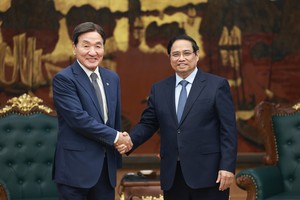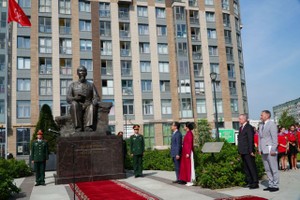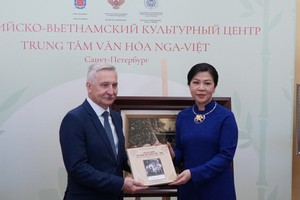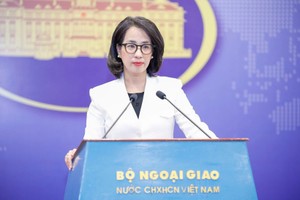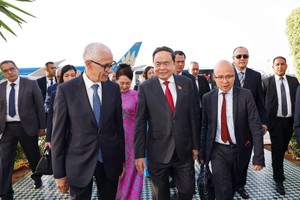HONG KONG, April 5, 2010 (AFP) - Japanese exporters made gains Monday on growing optimism over the global economic recovery as the dollar remained near seven-month highs following the highest US jobs growth in three years.
The greenback stayed near the 95-yen level -- despite a slight easing in Tokyo trade -- boosting Japanese firms' prospects for repatriated earnings.
"A new round of buying will kick in if more investors begin to expect the dollar to top 100 yen," said Kenichi Hirano of Japan's Tachibana Securities.
The headline Nikkei index of the Tokyo Stock Exchange closed up 53.21 points or 0.47 percent to 11,339.30. The broader Topix index of all first section shares added 6.29 points or 0.64 percent to 995.68.
However, gains were capped by a 10.60 percent tumble in Japan's largest clothing retailer Fast Retailing.
The stock plunged to 14,920 yen after the company said domestic same-store sales -- the portion of sales from existing stores as opposed to new ones -- at its Uniqlo chain dropped 16.4 percent year-on-year in March.
But analysts said the figures were less about seasonal trends and instead could reflect a move by consumers away from cheaper goods as the economy improves and amid competition from other retailers.
"Customers spend less during periods of deflation but now that the economy is recovering, customers will probably explore mid-priced items," a fund manager at a Japanese asset management firm told Dow Jones Newswires.
Short-selling, in which shares are borrowed from a broker and sold before being typically bought back later at a lower price, was also a factor in the stock's plunge Monday, analysts said.
Electronics giant Canon gained 2.50 percent to 4,510 yen while Toyota Motor was 1.05 percent higher at 3,815.
Sharp surged 3.30 percent to 1,249 after last week unveiling a 3D touchscreen that does not require the user to wear special glasses.
"Expectations for success in its 3D flat panel business are rising amid demand for 3D applications on smart phones and other gadgets," an analyst at a Japanese brokerage said.
Dai-ichi Life Insurance, which saw a huge debut last week, fell 2.52 percent to 158,400.
The dollar eased to 94.55 yen in Tokyo afternoon trade from 94.61 yen late Friday in Paris.
US currency markets were closed for the Easter holiday. The euro rose to 1.3529 dollars from 1.3478 and to 127.65 yen from 127.52.
Dealers said short-term players were buying back the single European currency after it fell against the greenback following the employment report, which showed that the US economy added 162,000 jobs in March.
The job growth rate was just enough to offset continued lay-offs, population growth and people rejoining the labour market.
"US employment data last Friday showed better underlying momentum in private sector employment and highlighted the ongoing recovery of the US labour market," Barclays Capital analyst Masafumi Yamamoto said.
At the same time the jobless rate remained steady at 9.7 percent. Since the recession began in December 2007, around eight million Americans have lost their jobs and 15 million remain unemployed.
Investors said dollar-selling will likely be short-lived and "doesn't suggest a shift in the medium-term outlook, which still favours dollar gains" against other currencies, a Tokyo trader told Dow Jones Newswires.
A prominent US lawmaker scolded US President Barack Obama's administration on Monday for delaying the release of a report that could declare China a currency manipulator and lead the way to trade sanctions.
"We have a real problem with the Chinese. They are very shrewd and customarily they outmanoeuvre us," said Democratic senator Arlen Specter, one of many American lawmakers clamouring for China to revalue the yuan.
"They take our jobs. They take our money and then they lend it back to us and own a big part of America," Specter told the "Fox News Sunday" television show, adding: "I'm not too happy about a delay."
US Treasury Secretary Timothy Geithner on Saturday delayed a semi-annual report scheduled for April 15 that could have declared that China was manipulating the value of its yuan, paving the way for trade sanctions.
US lawmakers across the spectrum have accused Beijing of deliberately undervaluing its currency, leading to a flood of inexpensive goods and contributing to a trade deficit that soared to nearly 227 billion dollars in 2009.
Bangkok was down 0.55 percent Monday while Mumbai gained 0.90 percent. Jakarta finished 2.02 percent higher and Manila closed up 0.79 percent. Singapore's Straits Times Index ended the day 0.86 percent higher.
South Korean shares closed flat, with continued foreign buying of blue chips but hefty profit-taking in smaller stocks.
The benchmark KOSPI ended up 1.50 points or 0.09 percent at 1,724.99.
"As long as the US market is bullish, you will see the blue chips rise," said Paul Balaoing, an analyst at Philippine PCCI Securities Brokers.
Top-traded Jollibee Foods Corp. gained 0.85 percent to 59.50 pesos while Philippine Long Distance Telephone Co. rose 1.65 percent to 2,460 pesos.
Bank of the Philippine Islands gained 1.11 percent to 45.50 pesos.
In Malaysia, the Kuala Lumpur Composite Index (KLCI) rose 0.43 percent, or 5.81 points, to close at 1,341.75 led by gains in finance stocks.
Among major stocks, lender Hong Leong Bank added 2.30 percent to 8.90 ringgit, Public Bank was up 1.70 percent to 12.0, while gaming group Genting lost 1.20 percent to 6.54.
Oil raced towards 86 dollars a barrel in Asian trade Monday, extending gains on optimism about signs of a global economic upswing, analysts said.
New York's light sweet crude for delivery in May was up 77 cents to 85.64 dollars a barrel. New York crude briefly traded above 85 dollars last week, its highest level since October 9, 2008.
Brent North Sea crude for May climbed 59 cents to 84.60 dollars a barrel.
Markets were closed for a public holiday in Australia, China, Hong Kong, and Taiwan.

